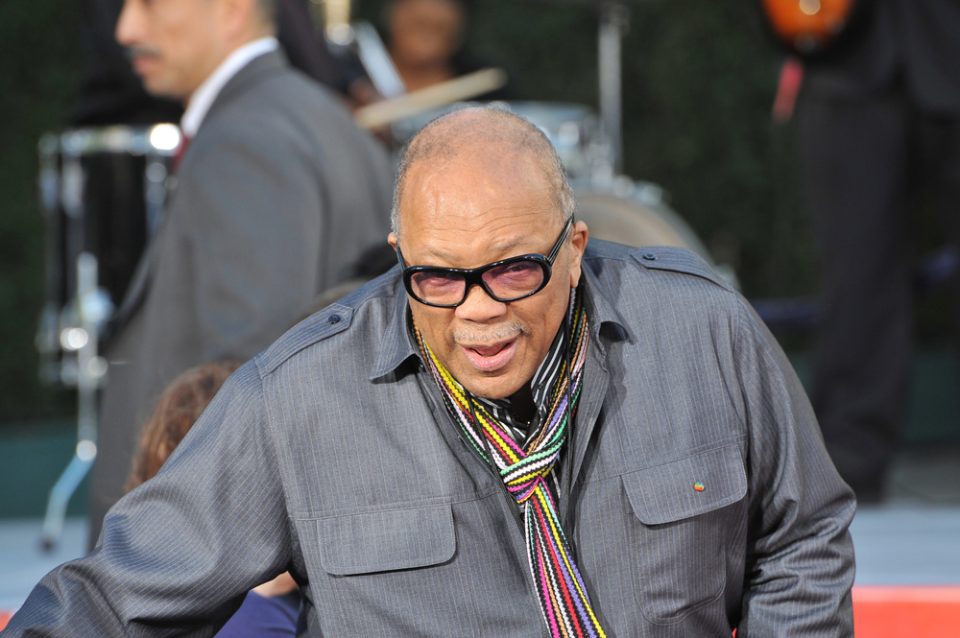Musical virtuoso’s unprecedented impact reverberates through generations of artists

The end of an era
The music world lost one of its most influential pioneers with the passing of Quincy Jones on November 3. His 91-year journey through the entertainment industry transformed the sound of popular music, leaving behind an unmatched legacy. Jones’s contributions to music, television, and culture transcended genres and generations, making him a figure whose impact will continue to resonate for decades.
Early foundations of greatness
Quincy Jones‘s journey began in the 1950s, a time when jazz was at the forefront of American music. Born in Chicago in 1933, Jones’s passion for music was evident early on, leading him to study at Seattle University and later with musical greats such as Ray Charles and Duke Ellington. His innovative arrangements and ability to merge traditional jazz with more contemporary styles quickly gained him recognition within the industry.
Working with prominent figures like Count Basie and Frank Sinatra, Jones established himself as a brilliant producer and arranger. His sophisticated approach to orchestration and ability to craft unique musical structures would set the stage for the groundbreaking work he would do in the years to come.
Revolutionizing music production
By the 1960s and 1970s, Quincy Jones had become one of the most prominent producers in the music industry, known for his ability to elevate the sounds of artists across genres. His collaborations with major figures like Frank Sinatra, Count Basie, and Sarah Vaughan helped shape a new era of music, blending traditional styles with modern influences.
Jones was a perfectionist, spending countless hours in the studio to craft sounds that would endure the test of time. His meticulous production techniques, combined with his ability to bring out the best in the artists he worked with, set new standards for music production that are still followed today. As a result, Jones became a trailblazer, influencing future generations of producers and arrangers.
A pivotal collaboration with Michael Jackson
Arguably, one of Quincy Jones’s most iconic achievements was his partnership with Michael Jackson, which led to the creation of some of the most influential albums in history, including Off the Wall, Thriller, and Bad. Of these, Thriller stands out not only as a commercial success but also as a revolutionary album that changed the music industry.
The album’s production, spearheaded by Jones, was groundbreaking in its use of synthesizers and complex arrangements. It was a turning point in pop music and introduced innovative music videos that became an essential part of Jackson’s legendary status. The success of Thriller set a new standard for how music could be marketed and consumed, and it solidified Jones’s reputation as a master of production.
Impact on culture and television
Quincy Jones’s influence extended beyond music. His career also touched television, where he made significant contributions to American pop culture. In the 1970s, Jones began composing for television shows, including the sitcom Sanford & Son and the critically acclaimed mini-series Roots. His ability to capture the emotional essence of these shows through music earned him recognition and respect beyond the music industry.
His role as executive producer for The Fresh Prince of Bel-Air in the 1990s further showcased his impact on popular culture. The show, which became a cultural phenomenon, was a platform for diverse representation in entertainment, something Jones had always championed. His ability to spot potential in projects that resonated with a wide range of audiences further solidified his status as a visionary in entertainment.
Humanitarian efforts through music
Quincy Jones’s impact wasn’t just about his music. In 1985, he orchestrated the We Are the World project, a charity single designed to raise funds for famine relief in Africa. The collaboration involved some of the biggest names in music, including Michael Jackson, Stevie Wonder, and Bob Dylan, and became one of the most successful humanitarian efforts in music history.
The project not only raised millions of dollars for the cause but also demonstrated Jones’s belief in the power of music to effect positive change. Throughout his career, Jones remained committed to using his platform to support various humanitarian initiatives, proving that his legacy was as much about the social impact of his work as it was about the music itself.
Legacy of innovation
Jones’s impact on the music industry is immeasurable. He revolutionized the way music was produced, shifting the focus from simple arrangements to complex, layered compositions that could transcend genres. His ability to adapt to changing times, embracing new technologies and genres, ensured that his work remained relevant across decades. Jones’s collaborations with artists from jazz, pop, and R&B helped break down cultural barriers and set new standards for what was possible in music production.
Jones also understood the importance of nurturing new talent. In the 1990s, he launched Vibe magazine, which became an influential platform for emerging voices in music and culture. His foresight in recognizing the growing influence of hip-hop and offering a space for the genre to flourish reflected his deep understanding of the evolving cultural landscape.
Conclusion
Quincy Jones’s legacy is one that spans far beyond his remarkable catalog of music. His innovative spirit, tireless dedication to his craft, and ability to adapt to the ever-changing entertainment industry made him one of the most influential figures in the history of music. As the world continues to celebrate his work, Jones’s influence remains an enduring force in shaping the future of entertainment, inspiring future generations of musicians, producers, and artists. His contributions to both music and culture will forever be remembered, ensuring that his impact will never be forgotten.














